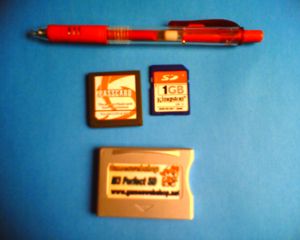I’d hoped to finish writing this post before my gran died so suddenly yesterday, but I guess I was a bit slow. I realised
that there were so many changes of tense to be made to make the article make sense that it was actually easier to start again. So I did.
On The Nature Of Models
I have a certain model of the universe and the way it works in my head, just as you do in yours. Some people’s models are more complex than others, and some are more complex in
different areas. A great example of model complexity comes from the usage of a car. A great number of people are able to drive a car – they know what pedals to press and what levers and
wheels and switches to operate to make the car go faster or slower, to make it turn corners, to park it safely, and to turn on things like the lights, indicators, and windscreen wipers.
The majority of these people do not understand – or need to understand – anything beyond the fundamentals of an internal combustion engine, or a car’s electrical system, or the
algorithm used to determine if ABS should be activated. This doesn’t make them bad drivers: this makes them bad mechanic… but not everybody wants to be a mechanic.
A mechanic has a somewhat deeper understanding of the car. Technically speaking, being a car mechanic doesn’t necessitate knowing how to drive (although it probably helps with learning
the trade and it’s certainly conventional). He knows that if it makes a particular bad noise to replace a particular part, and how to test different components. The car’s owner probably
barely looks at the engine, except to appear manly by the roadside after a breakdown by opening the bonnet and staring at it without the slightest comprehension of what is actually
wrong, and occassionally to check the oil or refill the water. But the mechanic knows how the car actually works, how the engine powers the wheels and how the mysterious gearbox
actually works and why the brakes squeak on old cars and how to pad a bill.
The mechanic probably can’t tell you how the electromagnets in the centrally-controlled door locks or the light-emitting diodes in the dashboard actually work, because that’s into the
realm of the physicist, and so on. We all have different models for different subsets of the universe, and the way that it works. And in particular, I’m about to talk about my model of
the fundamentals of the universe as a whole.
A Model Of The Universe
My model of the universe is a particularly clinicially scientific one. Like about 4% of the world’s population, I am an atheist – I believe that there are no deities. I am, at the most
fundamental levels, a determinist – I believe that with a good enough model everything could be explained and predicted, although I appreciate only one such model of the universe will
ever exist, and we’re standing in it. However, my determinist ideas are so fundamental that the question of free will doesn’t really come into it: while, technically, I don’t believe in
free will, I also don’t believe that it’s possible to determine with a reasonable degree of certainty either way, which makes my disbelief in free will a matter of faith, rather than of
scientific reason.
My model is more simplistic than that of many theoretical physicists: I don’t claim to understand string theory, or spacetime curvature, or any number of other things. For day to day
use, my model of gravity is Dan’s Simplified Gravitational Theory, which has one rule: “things fall down” (although at a deeper level, I’m quite happy with the idea that mass attracts
other mass, and can comprehend orbits and expansion and stuff). But it’s a well-packaged and strong model without holes, and I’m a firm believer in it. It’s my belief that humans
naturally build models in their head to explain the way the world works and make it more predictable. The “things fall down” theory of gravity is more than enough for a spear-throwing
caveman to use to catch an animal to skin and eat, and it’s fine for me to go and play frisbee on the beach, but it’s not enough to put a man on the moon. To do that took some far more
powerful models of the universe which had been refined by very clever people over hundreds (if not thousands) of years.
For a single paragraph, here, I’ll take what I feel is an intellectual high ground over many theists (particularly, right now, anti-evolutionists), and state that one thing I
do like about my model is that it’s malleable by science. When we’re talking about fundamentals like those discussed above, it is, to some degree, a matter of faith and “what
feels right” because it’s hard to prove either way whether free will exists, for example (and, in my mind, a pointless exercise anyway). But on other matters, scientific study can
really shine. Like many people (atheists and theists alike) I believe that the universe began taking it’s current form after an event long ago called the Big Bang (which is a silly
name, because it was neither big – depending on how you define it – nor did it make a bang). Scientists often talk about three key theories about what’ll happen at “the end” of the
universe: the Big Crunch (whereby the universe falls back in on itself and collpases into a single, tiny point), the Big Freeze (whereby the universe keeps expanding forever), and a
“sweet spot” in-between, and scientists are split on the three. There’s evidence for all three, and, as yet, no consensus. As a philosophically-minded individual, I like to hypothesise
about the possibilities, and come to conclusions. My belief is that the universe will eventually collapse into a Big Crunch. It became apparent to me recently, however, through a
thought experiment during a conversation, that I had failed to fully grasp a key concept of the Big Freeze and had dismissed it because of this. This lead me to a whole new
re-assessment of the possibilities, in which I eventually still settled on the Big Crunch as being the most likely option, in my mind. My model (a loose model, in this case: I don’t
think I have enough information about the Big Crunch to argue convincingly that it is certain, it’s just what I suspect) was shaken by new evidence, which caused me to re-assess my
position. In this case, as it happens, I came to the same conclusion as before. Nevertheless, I feel that one of the strengths of my model is that it allows itself to be challenged, and
broken, and re-assembled. Right; end of anti-blind-faith-rant.
Needless to say, my model does not have space for ghosts or spirits. While I appreciate that these things could exist, I feel that argument for them makes as much sense as argument for
unicorns, fairies, aliens “living among us”, and God. I’ll certainly agree that “there are things beyond what we know,” and I hope that always remains the case (the world is full of
mysteries, and that makes it beautiful): but I don’t think there’s any reason to jump onto superstitious beliefs to justify them.
So Where Does My Gran Fit In
So you’ve probably noticed the title of this article. Yeah; I’m getting to that.
In the days leading up to my grandma’s death, I’ve engaged in a couple of conversations with Claire about my gran’s beliefs and how they link
in with this whole “models of the universe” thing.
For as long as I can remember, my gran would always talk about her children and her grandchildren in a particular way: “I love all of my children and my grandchildren,” she would say,
“but Dan is the special one.” This singling out – this thinly-veiled favouritism – caused some embarrasment until it started becoming “just one of those things old people do,” like
talking about the war or complaining about the forms of entertainment/dress/communication enjoyed by young people today. I spoke to my gran on a handful of occassions about what she
meant by this strange statement, and she would explain: “You’re the one that I’ll talk to after I’m dead.”
As a young child, this filled me with a sense of both dread and pride: dread that “she could be right” (my godless, souless model of the world was not so hard-set as a child as it was
once I’d realised that higher-level physics, philosophy, and psychology held a lot of answers that evidenced it) and pride that, if she was, I had been “selected” as the “special one”
to receive the “gift” that she believed she had: the gift of talking to the dead.
Her spiritualistic beliefs, though, combined with my skeptical worldview, lead to some conflict. For example, one time I was talking to both my gran and my mum, when my gran was
relaying how she intended to communicate with my from beyond the grave (or, as it happens, beyond the grate: she wanted to be cremated):
“You’ve got to look out for bad spirits,” she warned me, “But you’ll know that it’s me that’s talking to you because I’ll call you my little white rabbit.” [a nickname she had for me
when I was very young, perhaps because of the intensely blonde hair I sported]
“But that won’t prove anything,” my mum, who is also an excellent skeptic, although I sometimes wonder whether her models are too concrete, and I argued, “Because I could now
imagine I’d heard that. What you need to do, to prove that it’s you, if you’re right, is to tell me something that I couldn’t possibly have known otherwise: something that you hadn’t
told me before you died, but which we could later verify.”
It took a little while to explain this concept to her, and we gave her an example of some information that we didn’t know, but that she did and we could potentially find out after her
death, if necessary. “Oh, that’s easy,” she said, and promptly told us the information. It seemed that she hadn’t quite grasped the concept at all. So, we had a few more drinks and left
the conversation to finish another time.
My gran’s raving spiritualism rarely got in the way of anybody. Sure, she made me promise never to use a Ouija board (she had a
particularly terrifying experience while using one and since decided that they were dangerous) and there was that one time she argued with her grandma about fireworks,
upsetting my sisters, but in general, she seemed to appreciate that her beliefs were hers and not those of many others.
Models, Meet Grandma; Grandma, Models
And so we come full circle back to mental models, and my conversations with Claire. We were saying about how having such well-defined and rarely-challenged mental models of the universe
as we do is, in a way, a boring stagnation. It’s rare, these days, for our models to be challenged by anything that can not be (very easily) explained, and that’s uninteresting (I
disagree with Claire that it made the world boring, because there’s still plenty of mystery left that lacks any conclusive evidence whatsoever), and we came on, in the days
before my grandma died, to discussing her curious prophecy that she’ll continue to talk to me from the afterlife.
And so, the skeptics that we are, we came up with a suite of experiments to help provide evidence for or against any voices that I hear, dreams I have, or whatever, actually being my
post-death grandmother. I don’t believe it for a moment, but I wouldn’t be a very good skeptic if I wasn’t skeptical about my own beliefs, too. We came up with well defined hypotheses
for different scenarios and sensible ways to collate information. It’s kind of interesting to develop experiments to test data that you never expect to obtain for a hypothesis you don’t
believe in, but it’s the nature of science to question things, and, even if the only evidence so far is that “my gran said it”, our construction of a virtual laboratory in which to test
a crazy theory (if the data is ever delivered) made a long car journey quite a lot more enjoyable.
And honestly; it’d be as interesting to prove as to disprove. Now all I need is to start hallucinating.


